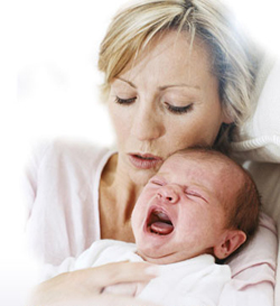If there’s one thing that babies do — aside from sleeping and pooping, of course — it’s cry. Babies have to cry in order to communicate, and it’s their go-to activity when they need to tell you they’re hungry, tired, in need of a diaper change, or just want to be held.
But sometimes, a baby cries more than normal. There are many reasons why babies cry, and understanding them will help you to know if there’s something wrong with your little one … or he or she just wants Mommy time.
1. Hungry baby
When baby is hungry, the cry will be persistent and insistent. He or she may smack the lips, and turn the head toward your hand if you place it near the baby’s face. Your infant may start fussing well before the crying, so watch for signs.
If it’s been an hour or two since you fed the baby, he or she may be hungry again.
2. Dirty baby
When babies’ diaper are dirty, they tend to get fussy pretty quickly. The cry will sound annoyed, and you’ll find that your baby may move around a bit more. You should check the diaper any time your infant cries, because changing a dirty diaper can stop the crying pretty quickly.
3. Tired baby
If your baby is tired, you’ll find that he or she will be much fussier than when hungry or in need of a change. Babies sometimes don’t realize they can simply drift off to sleep, so they cry because they’re annoyed about being tired.
Take a few minutes to walk with baby around the room — after you’ve checked the diaper, of course. If your baby is crying because of weariness, he or she will nod off in just a few minutes.
4. Cuddly baby
Many babies need to be held, and they cry to let Mom know “It’s time for you to hold and cuddle me.” It’s a comforting thing to have parents close by, and babies need the security of Mom’s or Dad’s familiar heartbeat, scent, and warmth.
Don’t worry about thinking you’re spoiling your baby by holding him or her so much. Pick the little one up and carry the infant around in your arms. As your son or daughter grows, you can use a baby carrier or sling in order to give your arms a break from an increasingly heavy baby.
5. Gassy baby
Babies’ stomachs are pretty sensitive, and you may find that gas can build up in their digestive tract pretty easily. If you eat garlic, strong spices, or other strong foods, they may be passed to the little one via your breast milk and cause a gas buildup.
Babies who need to burp will often be fussy, because the accumulation of gas in their bellies can be painful. If your baby has just been fed and is still crying, try to elicit a burp.
6. Annoyed baby
Babies can be surprisingly fussy when they are annoyed by something, such as a onesie that’s too tight, a blanket wrapped around their foot too tightly, a yucky pacifier, or scratchy clothing. If you find that baby is moving around a lot and crying, they may be uncomfortable and annoyed.
See if you can find the problem that’s annoying your baby, and he or she should stop crying pretty quickly.
7. Sick baby
Colic can be a parent’s nightmare, but it’s only officially colic once baby has cried for more than three hours: three very long hours! Baby can get sick from formula that’s too strong, or from your breast milk if you ate something strong.
If your baby has colic, holding and rocking may not be enough. You may need to use colic remedies, or take your child to the doctor to get advice on how to treat the problem.
Originally posted on November 8, 2013 @ 10:30 am
